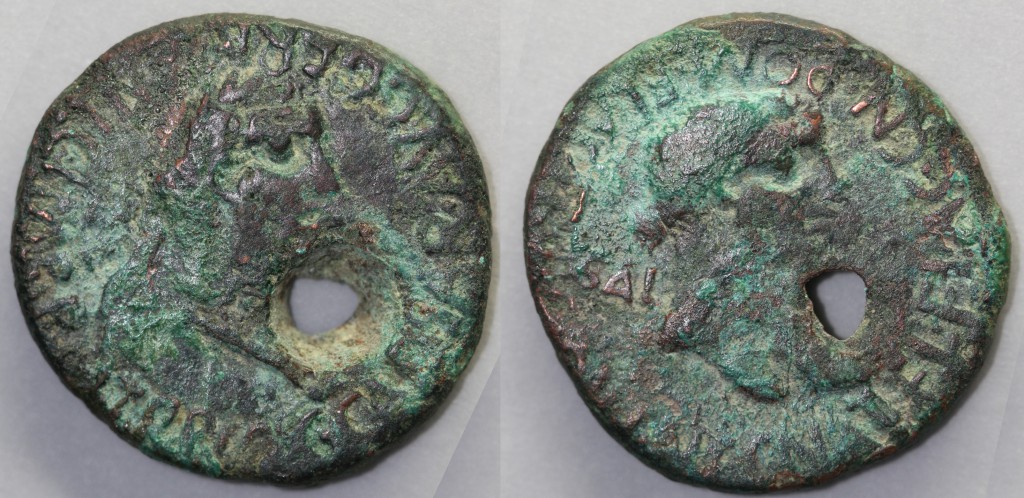August 31, 2015, by Will Leveritt
On this day in AD 12, Caligula was born
Text by Annabel Rock-Clarke
Image © Mint Imperials
Gaius Julius Caesar Augustus Germanicus was born in Antium on the 31st August AD 12. He is more commonly known as Caligula. He was the son of the extremely popular general, Germanicus, a nephew of Augustus who was adopted by the emperor Tiberius but died young at age 34, and Agrippina the Elder, a granddaughter of Augustus.

AE as of Caligula. Obverse has laureate head of the emperor r., C CAESAR AVG GERMANIC IMP P M TR P COS. Reverse has female head r. (variously identified), CN ATEL FLAC CN POM FLAC II VIR Q V I N C / SAL AVG. Small hole through the coin. 28.5mm, 13.48g, 4 o’clock.
From a young age he accompanied his father on his campaigns in the north of Germania. It was on these campaigns, dressed in a miniature soldier’s uniform that he gained the nickname ‘Caligula’, from the word for a soldier’s boot (caligae). Thus his nickname meant ‘little boots’.
Caligula’s life after the death of Augustus in AD 14 became rather complicated. His father died suddenly in AD 19 (perhaps poisoned by the senator Lucius Calpurnius Piso) and his mother became entangled in a bitter feud with the new emperor, Tiberius, leading to her exile along with Caligula’s brother Nero (not to be confused with the emperor of the same name!)
Caligula was the sole male survivor of this family feud and in AD 31 accepted the invitation to join the emperor, who had withdrawn to the island of Capri. To the surprise of everyone, Tiberius spared Caligula but later in his own reign, Caligula claimed to have planned to kill Tiberius with a dagger in order to avenge his mother and brother.
Tiberius died, perhaps murdered by his Praetorian Prefect, Macro, in AD 37 and was succeeded by Caligula. The ancient writer Philo claims that for the first six months of his reign Caligula was a noble and moderate ruler. But our sources claim that after this honeymoon period, Caligula descended into cruelty and extravagance, and they portray him as an insane tyrant. Philo and Seneca describe how Caligula was self-absorbed, angry, killed on a whim and indulged in too much spending and sex.
Our sources accuse him of once, at some games, ordering his guards to throw an entire section of the crowd into the arena to be eaten by animals because there were no criminals to be prosecuted. He is also accused of incest with all three of his sisters. Perhaps the most famous anecdote concerns his attempt to make his horse, Incitatus, a consul and appoint him a priest.
His short, three year reign came to end when the Praetorian Guard, led by the guardsman Cassius Chaerea conspired to rid themselves of Caligula’s tyrannical ways. This conspiracy had wide support among the senate the army and other sections of Roman society whom had become alienated by the emperor’s shocking, ruthless and brutal behaviour.
Thus, on the 22 January AD 41, at a series of games held for the Divine Augustus, Chaerea and the assassins sought out Caligula. They found him in the underground tunnel (the cryptoporticus) underneath the imperial palace complex on the Palatine hill. Chaerea struck first, followed by his co-conspirators, stabbing the emperor to death. His family, his wife, and even his young daughter, Julia Drusilla, we all similarly hunted down and murdered.
After the event, there was apparently some talk amongst members of the senate concerning the restoration of a free republic. Unfortunately, the Praetorian Guard took matters into their own hands, scouring the imperial palace for a member of the Julio-Claudians to succeed Caligula.
They found his uncle Claudius, so it is claimed, hiding behind a curtain in the palace and took him to their camp whereupon they saluted him as emperor. Unfortunately for Chaerea and the other assassins, in order to placate the Roman people (among whom Caligula had been popular) the new emperor put to death anyone who had been involved in Caligula’s murder.
No comments yet, fill out a comment to be the first

Leave a Reply